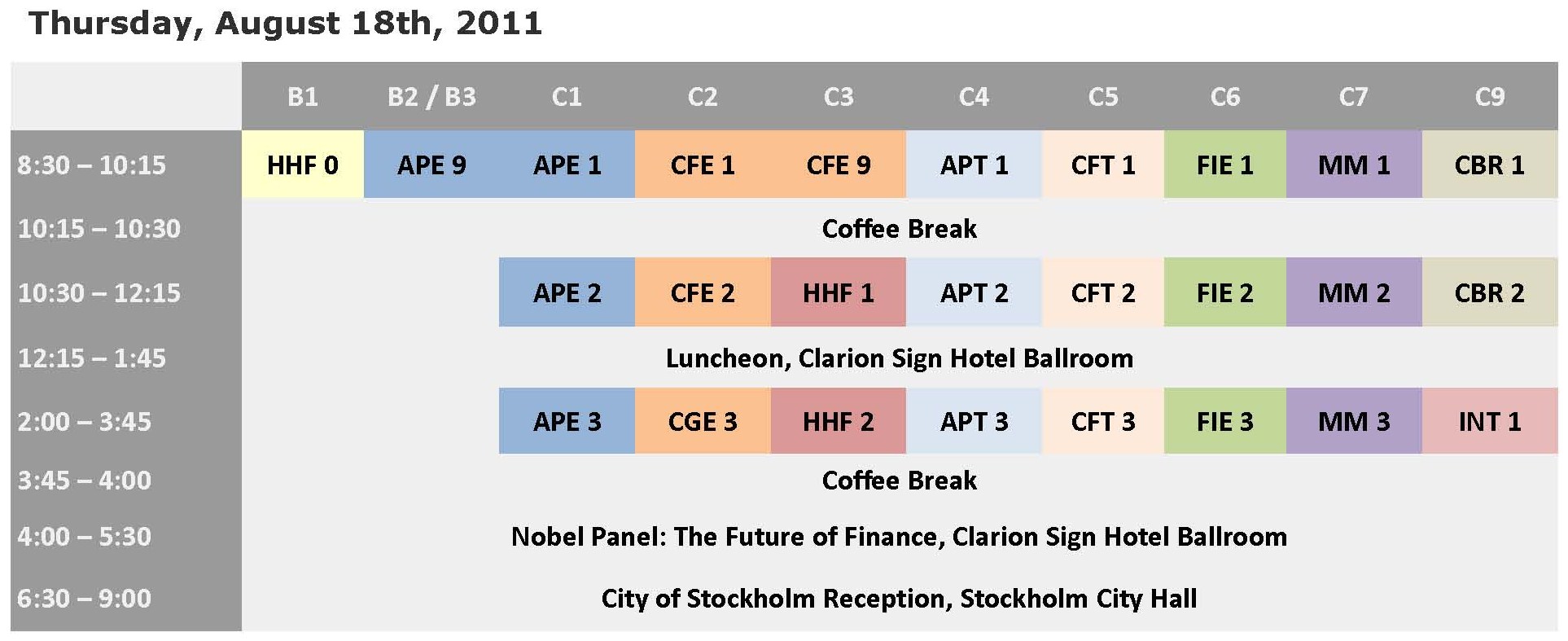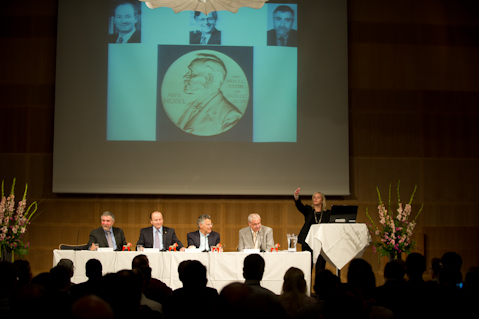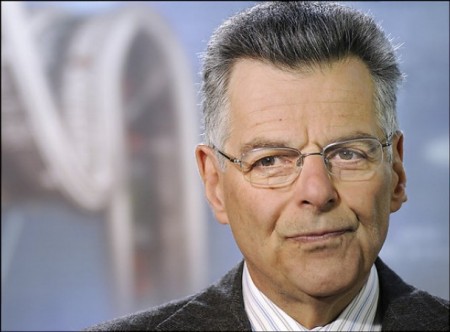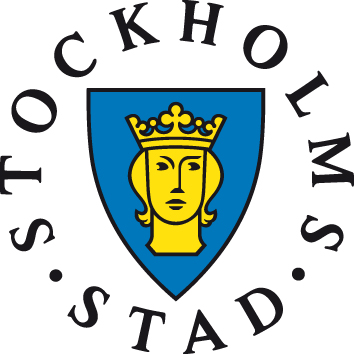“THE FUTURE OF FINANCE”
Panelists:
Professor Paul R. Krugman, Princeton University
Professor Robert C. Merton, Massachusetts Institute for Technology
Professor Myron S. Scholes, Stanford University
.
.
Moderator:
René M. Stulz, The Ohio State University
René M. Stulz, The Ohio State University
Sponsored by Stiftelsen Riksbankens Jubileumsfond
.
.
.
Panelist and Moderator Bios
.
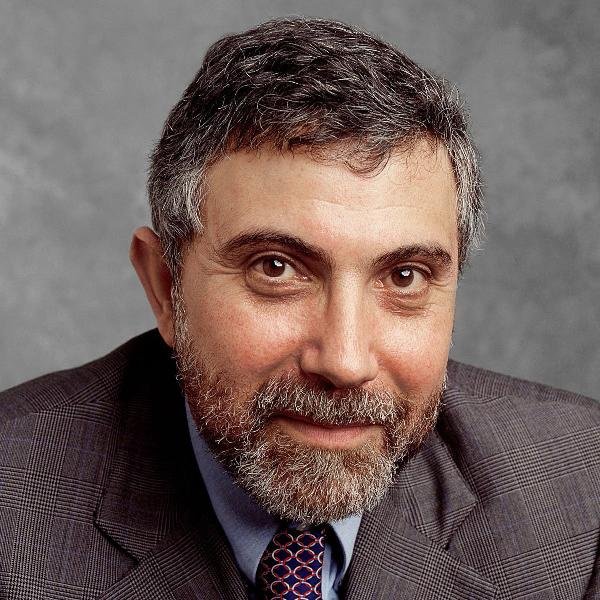 Paul R. Krugman, Princeton University
Paul R. Krugman, Princeton UniversityPaul Krugman is the Professor of Economics and International Affairs at Princeton University. He is also Centenary Professor at the London School of Economics and an op-ed columnist for The New York Times. Krugman is the author or editor of 23 books and more than 200 professional journal articles, many of them on international trade and finance.
In December 2008, Mr. Krugman received the Nobel Memorial Prize in Economic Sciences, honoring his work in international trade patterns. Previously he was awarded what is understood to be the European Pulitzer Prize, the Asturias Award given by the King of Spain. He received the John Bates Clark Medal from the American Economic Association, an award given every two years to the top economist under the age of 40.
For more than 20 years, Krugman has written extensively for non-economists, including a monthly column, “The Dismal Science,” for the on-line magazine Slate. He has also been a columnist for Fortune and has published articles in The New Republic, Foreign Policy,Newsweek, and The New York Times Magazine, before joining The New York Times. In recognition of his influence, the Washington Post called him “the most important political columnist in America” and The Economist said “he is the most celebrated economist of his generation.”
Prior to his appointment at Princeton, Krugman served on the faculty of MIT; his last post was Ford International Professor of Economics. He has also taught at Yale and Stanford Universities, and prior to that he was the senior international economist for the President’s Council of Economic Advisers, under Ronald Reagan. (Yes, he served under a conservative President.)
He is a Fellow of the Econometric Society, a Research Associate of the National Bureau of Economic Research, and a member of the Group of Thirty. He has served as a consultant to the Federal Reserve Bank of New York, the World Bank, the International Monetary Fund, the United Nations, as well as to a number of countries including Portugal and the Philippines.
His most recent book is The Return of Depression Economics and the Crisis of 2008 and the paperback edition of The Conscience of A Liberal. His previous work, The Great Unraveling, was highly praised and became a New York Times bestseller in both hardcover and paperback. Mr. Krugman and his wife, Robin Wells, have recently collaborated on two college textbooks —Microeconomics published in October 2004, and Macroeconomics published in the September 2005.
.
.
Robert C. Merton is the School of Management Distinguished Professor of Finance at the MIT Sloan School of Management. He is University Professor Emeritus at Harvard University. Merton was the George Fisher Baker Professor of Business Administration (1988-98) and John and Natty McArthur University Professor (1998-2010) at the Harvard Business School. He previously served on the finance faculty of the Sloan School from 1970 until 1988. Merton received the Alfred Nobel Memorial Prize in Economic Sciences in 1997 for a new method to determine the value of derivatives. He is past President of the American Finance Association, a member of the National Academy of Sciences and a fellow of the American Academy of Arts and Sciences.
Merton’s research focuses on finance theory including lifecycle finance, optimal intertemporal portfolio selection, capital asset pricing, pricing of options, risky corporate debt, loan guarantees, and other complex derivative securities. He has also written on the operation and regulation of financial institutions. Merton’s current academic interests include financial innovation and dynamics of institutional change, controlling the propagation of macro financial risk, and improving methods of measuring and managing sovereign risk. He is the author of, Continuous-Time Finance, and a co-author of Cases in Financial Engineering: Applied Studies of Financial Innovation; The Global Financial System: A Functional Perspective; Finance; and Financial Economics.
Merton has also been recognized for translating finance science into practice. He received the inaugural Financial Engineer of the Year Award from the International Association of Financial Engineers in 1993, which also elected him a Senior Fellow. Derivatives Strategy magazine named him to its Derivatives Hall of Fame as did Risk magazine to its Risk Hall of Fame. He also received Risk’s Lifetime Achievement Award for contributions to the field of risk management. A Distinguished Fellow of the Institute for Quantitative Research in Finance (‘Q Group’) and a Fellow of the Financial Management Association, Merton received the Nicholas Molodovsky Award from the CFA Institute. He co-founded Long-Term Capital Management. Merton is currently Resident Scientist at Dimensional Fund Advisors, where he is developing a next-generation integrated pension-management solution system that addresses deficiencies associated with traditional defined-benefit and defined-contribution plans.
Merton received a B.S. in Engineering Mathematics from Columbia University, a M.S. in Applied Mathematics from California Institute of Technology and a Ph.D. in Economics from Massachusetts Institute of Technology.
.
.
Myron S. Scholes is Chairman of the Board of Economic Advisors of Stamos Asset Management. He was Chairman of Platinum Grove Asset Management, an alternative investment fund until 2009. Professor Scholes is the Frank E. Buck Professor of Finance Emeritus, at the Stanford University Graduate School of Business since 1996. Professor Scholes is currently a director of Dimensional Fund Investors mutual funds, American Century (Mountain View) mutual funds.
Professor Scholes is widely known for his seminal work in options pricing, capital markets, tax policies and the financial services industry. He is widely published in academic journals. He is co-originator of the Black-Scholes options pricing model, which is the basis of the pricing and risk-management technology that is used to value and to manage the risk of financial instruments around the world. For this work, he was awarded the Alfred Nobel Memorial Prize in Economic Sciences in 1997.
He was the Frank E. Buck Professor of Finance at the Stanford University Graduate School of Business from 1983 to 1996, and a Senior Research Fellow at the Hoover Institution from 1987 to 1996. He received a PhD in 1969 from the University of Chicago where he served as the Edward Eagle Brown Professor of Finance in the Graduate School of Business from 1974 to1983 and where he was the Director of the Center for Research in Security Prices from 1976 to 1983. He was an Assistant and Associate Professor of Finance at MIT’s Sloan School of Management from 1969 to 1974.
Professor Scholes is a member of the Econometric Society and served as President of the American Finance Association in 1990. Professor Scholes has honorary doctorate degrees from the University of Paris, France, McMaster University, Canada, Louvain University, Belgium and Wilfrid Laurier University, Canada.
Professor Scholes has consulted widely with many financial institutions, corporations and exchanges and continues to lecture for many organizations around the world. He was a principal and limited partner at Long-Term Capital Management, L.P., an investment management firm, from 1993-1998. From 1991 to 1993, he was a Managing Director at Salomon Brothers, a member of Salomon’s risk management committee, and as Co-Head of its Fixed Income Derivatives Sales and Trading Department was instrumental in building Salomon Swapco, its derivatives intermediation subsidiary, and in expanding its derivative sales and trading group.
Professor Scholes is widely known for his seminal work in options pricing, capital markets, tax policies and the financial services industry. He is widely published in academic journals. He is co-originator of the Black-Scholes options pricing model, which is the basis of the pricing and risk-management technology that is used to value and to manage the risk of financial instruments around the world. For this work, he was awarded the Alfred Nobel Memorial Prize in Economic Sciences in 1997.
He was the Frank E. Buck Professor of Finance at the Stanford University Graduate School of Business from 1983 to 1996, and a Senior Research Fellow at the Hoover Institution from 1987 to 1996. He received a PhD in 1969 from the University of Chicago where he served as the Edward Eagle Brown Professor of Finance in the Graduate School of Business from 1974 to1983 and where he was the Director of the Center for Research in Security Prices from 1976 to 1983. He was an Assistant and Associate Professor of Finance at MIT’s Sloan School of Management from 1969 to 1974.
Professor Scholes is a member of the Econometric Society and served as President of the American Finance Association in 1990. Professor Scholes has honorary doctorate degrees from the University of Paris, France, McMaster University, Canada, Louvain University, Belgium and Wilfrid Laurier University, Canada.
Professor Scholes has consulted widely with many financial institutions, corporations and exchanges and continues to lecture for many organizations around the world. He was a principal and limited partner at Long-Term Capital Management, L.P., an investment management firm, from 1993-1998. From 1991 to 1993, he was a Managing Director at Salomon Brothers, a member of Salomon’s risk management committee, and as Co-Head of its Fixed Income Derivatives Sales and Trading Department was instrumental in building Salomon Swapco, its derivatives intermediation subsidiary, and in expanding its derivative sales and trading group.
.
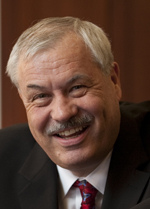 René M. Stulz, The Ohio State University
René M. Stulz, The Ohio State UniversityRené M. Stulz is the Everett D. Reese Chair of Banking and Monetary Economics and the Director of the Dice Center for Research in Financial Economics at The Ohio State University. He has also taught at the Massachusetts Institute of Technology, the University of Chicago, and the University of Rochester. He received his Ph.D. from the Massachusetts Institute of Technology. He was awarded a Marvin Bower Fellowship from the Harvard Business School, a Doctorat Honoris Causa from the University of Neuchâtel, and the Risk Manager Award of the Global Association of Risk Professionals. In 2004, the magazine Treasury and Risk Management named him one of the 100 most influential people in finance. A recent study found that he was the sixth most often cited contributor to the top journals in financial economics from 2003 to 2008. He is a past president of the American Finance Association and of the Western Finance Association, and a fellow of the American Finance Association, of the Financial Management Association, and of the European Corporate Governance Institute.
René M. Stulz was the editor of the Journal of Finance, the leading academic publication in the field of finance, for twelve years. He is on the editorial board of more than ten academic and practitioner journals. Further, he is a member of the Asset Pricing and Corporate Finance Programs and the director of the Risk of Financial Institutions Group of the National Bureau of Economic Research. He is also a member of the Squam Lake Group.
He has published more than sixty papers in finance and economics journals, including the Journal of Political Economy, the Journal of Financial Economics, the Journal of Finance, and the Review of Financial Studies. He is the author of a textbook titled Risk Management and Derivatives, a co-author of the Squam Lake Report: Fixing the Financial System, and has edited several books, including the Handbook of the Economics of Finance.
René M. Stulz has taught in executive development programs in the U.S., Europe, and Asia. He has consulted for major corporations, law firms, the New York Stock Exchange, the IMF, and the World Bank. He is a director of Banque Bonhote, the president of the Gamma Foundation, and a trustee of the Global Association of Risk Professionals.

